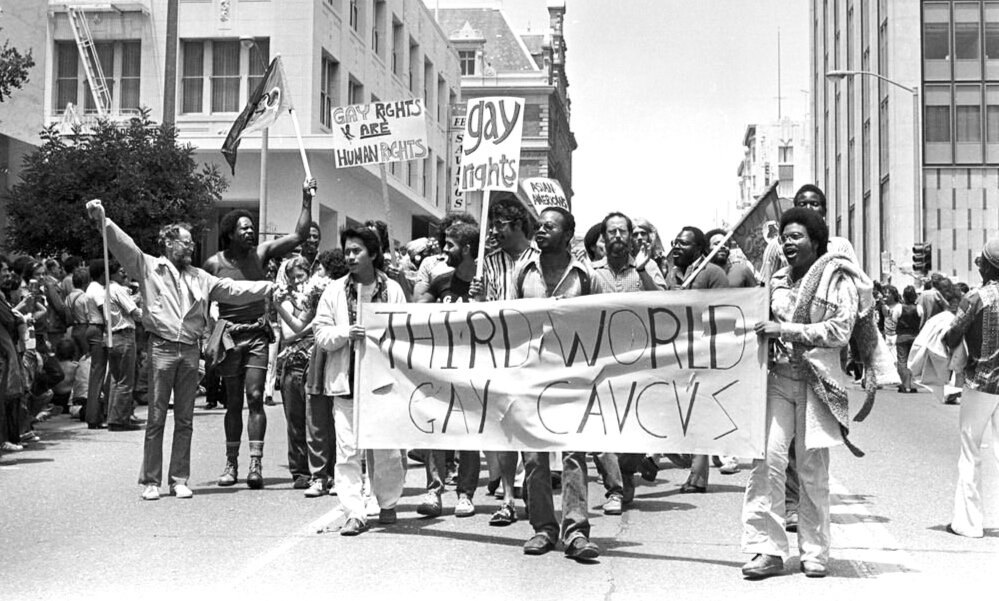labor of love: the birth of san francisco pride, 1970–1980
Curated by Gerard Koskovich, Don Romesburg and Amy Sueyoshi
About the Exhibition
“Labor of Love” showcases how San Francisco in the 1970s forged the internationally renowned annual celebration that would come to be known as the San Francisco Lesbian, Gay, Bisexual, Transgender Pride Parade. “Labor of Love: The Birth of San Francisco Pride, 1970–1980” opens on the society’s website on June 15.
“Christopher Street Liberation Day Gay-In,” offset flyer, 1970; Charles Thorpe Papers (1987-02), GLBT Historical Society.
On June 27, 1970, a band of hippies and “hair fairies” staged San Francisco’s first Pride celebration: a small march on Polk Street, followed on the 28th by a “gay-in” in Golden Gate Park. Over the course of the decade, this gathering—initially referred to as Christopher Street West, and then as Gay Freedom Day—became an annual San Francisco event, growing by leaps and bounds. In 1980, it drew some 250,000 participants and spectators.
“Labor of Love” revisits the first ten years of San Francisco Pride. Featuring historic photographs, ephemera, artifacts, and film and sound recordings from the archives of the GLBT Historical Society and from community members, the exhibition explores the goals, the controversies, the hard work, the desires and the sometimes-competing spirits of struggle and celebration that laid the foundation for one of the city’s best-known public festivals.
The exhibition is co-curated by Gerard Koskovich, a public historian and rare book dealer; Don Romesburg, professor of gender and women’s studies at Sonoma State University; and Amy Sueyoshi, dean of the College of Ethnic Studies at San Francisco State University. They emphasize that Pride has traditionally deployed both frivolity and protest to promote a positive cultural shift in how society views LGBTQ people.
San Francisco Gay Pride Program, 1972; Ephemera Collection, GLBT Historical Society.
The exhibition is organized around four themes. “Why Pride?” considers how organizers and community members explained the purpose of the annual gathering. “The Work of Pride” explores the ever-increasing commitment to planning, fundraising, volunteer support and governance that the event required. “Pride Fights” grapples with the debates over what Pride should be, who should be included, who should make the decisions and how they should be made. Finally, “Big Gay Family” highlights how the creation of San Francisco Pride brought diverse people into a collective yet often contested kinship.
The final section of the show, “Pride: From Past to Future,” is interactive, with visitors to the online exhibition asked to reflect on the history, then look ahead by submitting their responses to two questions: “How will the future of Pride be shaped? How should it be shaped?” The answers will be posted in the online gallery to spark an ongoing dialog about the heritage of Pride.
“Labor of Love” opens Monday, June 15 on the GLBT Historical Society’s website at glbthistory.org. The exhibition will also be installed as a physical exhibition at the GLBT Historical Society Museum at 4127 18th. Street in San Francisco’s Castro district once the state’s shelter-in-place orders have been relaxed.
About the Curators
Gerard Koskovich is a San Francisco historian and rare book dealer. A founding member of the GLBT Historical Society, he has been active in the movement to create LGBTQ archives and museums for nearly four decades and has curated numerous exhibitions. Koskovich has presented widely, including talks at the Ecole du Louvre, Kyoto University and Oxford University, and has published extensively in English and French. Most recently he has focused on the work of Dr. Magnus Hirschfeld (1868–1935); the history of queer history in the United States; and LGBTQ place-based history.
Don Romesburg is professor of women's and gender studies at Sonoma State University and a co-founder of the GLBT Historical Society Museum. He is editor of the Routledge History of Queer America (2018) and has published queer takes on public history, histories of adolescence, sex work, transracial adoption and queer/trans performers. He was the lead scholar working to bring LGBTQ content into California's K–12 History-Social Science Framework and textbooks and now trains educators on implementation. For these efforts, he is the namesake of the Committee on LGBT History’s Don Romesburg Prize for K–12 Curriculum.
Amy Sueyoshi is dean of the College of Ethnic Studies at San Francisco State University. A historian by training, her research lies at the intersection of Asian American studies and sexuality studies. She has authored two books: Queer Compulsions: Race, Nation, and Sexuality in the Affairs of Yone Noguchi (2012) and Discriminating Sex: White Leisure and the Making of the American “Oriental” (2018). Sueyoshi is a founding co-curator of the GLBT Historical Society Museum and served as co-chair of the inaugural Queer History Conference 2019 hosted by the Committee on LGBT History.
Complementary Exhibition
A complementary online exhibition about San Francisco Pride, “50 Years of Pride,” documents and celebrates five decades of Pride in the city. Presented by the GLBT Historical Society and the San Francisco Arts Commission Galleries (SFAC) with the support of San Francisco Pride, “50 Years of Pride” is available on the GLBT Historical Society’s website at glbthistory.org/50-years-of-pride.
This exhibition is made possible in part by First Republic Bank.
Banner photo: Third World Gay Caucus contingent, San Francisco Gay Freedom Day Parade, 1977; photograph by Marie Ueda, Marie Ueda Collection (2006-12), GLBT Historical Society.





